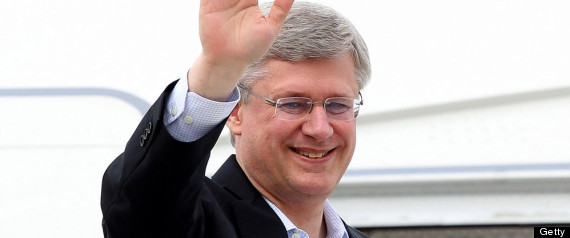
Stephen Harper had only been Conservative opposition leader a few weeks when he summoned his then shadow cabinet, and offered an unexpected warning to anyone who might someday get the urge to replace him.
"Learn French," a former senior official recalls Harper advising any would-be successors in the room.
"And, for sure, be patient because he planned to become prime minister and stay there for a very long time."
Nine years later, all evidence suggests Harper retains an iron grip on his party's leadership, and there are no reports of wannabe successors lining up for French lessons.
Yet, for the first time since Harper moved into the Prime Minister's Office seven years ago, speculation about his possible retirement before the next election in 2015 has now become part of the routine chatter in political circles.
This week, CBC asked a dozen Conservative strategists, staffers and other insiders whether they thought Harper would stay for the next election.
The bets were almost evenly split, albeit most opinions were couched with all kinds of caveats and general uncertainty.
This week, reporters raised the issue with the prime minister publicly while he was on his annual summer tour of the Arctic, asking Harper point-blank if he would be leading the Conservatives to the polls just over two years from now.
He sounded almost offended by the query.
"Of course," he replied. "I'm actually disappointed you feel the need to ask that question."
One Toronto columnist used Harper's statement to dismiss the whole notion of any possible early retirement as largely the product of idle media minds trying to fill the summer news doldrums.
But there's a lot more than media mischief fuelling so much speculation in high places.
First and foremost, the Conservatives are in a heap of political trouble that has clearly damaged the party's standings in the opinion polls.
While this isn't the first hit the Harper administration has taken in the past few years, the difference this time is that the Conservatives are showing no signs of rebounding with voters.
If that downward trend in popularity continues well into 2014, what will Harper do if he is staring at an election from the basement of public opinion?
The devil they know
A number of Conservative strategists we surveyed were adamant Harper will fight the next election come hell or high water — or sagging polling numbers.
They point out that his primary political goal remains the destruction of the Liberals and ensuring that the Conservatives become the "natural governing party" of this century.
And they believe that a Harper-led election campaign, backed by the forever well-funded and ferocious Conservative attack machine, would damage if not devastate Justin Trudeau and the Liberals, leaving moderate swing voters with no choice but to hold their nose and vote for the devil they know.
At the very least, those convinced that Harper will stay argue that, in the likely event the next election will be fought on the economy, Trudeau will have a tough time convincing voters he is the best leader to manage their money.
Finally, Harper boosters say he simply likes being prime minister, and that it is not in his DNA to quit in the face of adversity — nor admit there might be someone in the Conservative ranks better suited to lead the party through this next election.
On the other hand, there is an equally powerful argument that Harper is the ultimate political tactician, and if he sees the writing on the wall a year from now and it spells possible defeat, he may want to quit to give the party a fighting chance under a new leader.
The inevitable downside of all those millions of dollars the Conservatives poured into branding the "Harper government" means that when things go badly for the administration, the prime minister wears it.
And when things go very badly, or voters just get tired of the same old government in power, changing leaders is an obvious fix.
Checking off boxes
Those who have come to believe Harper may quit before the next trip to the polls point out that one of his most important considerations — perhaps even the most important — is whether he will have completed his personal mission.
Harper can certainly check off a lot of the boxes.
He has successfully merged conservatives into a single new party that has now won three federal elections, the last one by a decisive majority.
He has also presided over the creation of a modern, efficient political machine that will be tough for any party to beat.
While many core Conservatives have been disappointed Harper didn't drive the party further to the right, he has managed to implement much of the Reform-Alliance agenda without alienating moderate swing voters critical to winning elections.
If the government can stay on track to balance the books by the current target, 2015-16, history will likely afford him at least a passing grade for fiscal prudence.
Unlike some of his prime ministerial predecessors, Harper is not a leader of grandiose visions — his incremental politics is specifically designed to bring about change in small steps.
As a result, he could retire a year from now with not a lot left on his governing to-do list.
Harper may not be able to say he fulfilled his dream of destroying the Liberal party and taking down a Trudeau, too.
But reducing the Liberals to 34 seats and third-party status the last time out was still an electoral rout of historic proportion.
Of course, no one knows what Harper will decide to do a year from now, much less why.
He may decide to quit politics for family reasons.
Or he may decide to stay simply because he loves the job.
And if Harper does decide to step down as prime minister and Conservative leader before the next election, who will really care that this week he said he wouldn't?

No comments:
Post a Comment